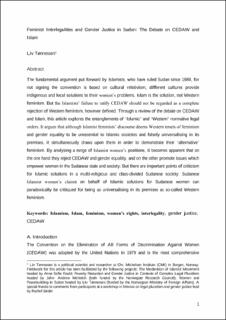Feminist interlegalities and gender justice in Sudan: The debate on CEDAW and Islam
Journal article, Peer reviewed
Permanent lenke
https://hdl.handle.net/11250/3029988Utgivelsesdato
2011-01-01Metadata
Vis full innførselSamlinger
- Publications [1488]
Originalversjon
in Religion and Human Rights: An International Journal vol. 6 no. 1, pp. 25-39 10.1163/187103211X543635Sammendrag
The fundamental argument put forward by Islamists, who have ruled Sudan since 1989, for not signing the convention is based on cultural relativism; different cultures provide indigenous and local solutions to their women's problems. Islam is the solution, not Western feminism. But the Islamists' failure to ratify CEDAW should not be regarded as a complete rejection of Western feminism, however defined. Through a review of the debate on CEDAW and Islam, this article explores the entanglements of `Islamic' and `Western' normative legal orders. It argues that although Islamist feminists' discourse deems Western tenets of feminism and gender equality to be unessential to Islamic societies and falsely universalising in its premises, it simultaneously draws upon them in order to demonstrate their `alternative' feminism. By analysing a range of Islamist women's positions, it becomes apparent that on the one hand they reject CEDAW and gender equality, and on the other promote issues which empower women in the Sudanese state and society. But there are important points of criticism to be made regarding Islamic solutions in a multi-religious and class-divided Sudanese society. Sudanese Islamist women's claims on behalf of Islamic solutions for Sudanese women can paradoxically be critiqued being as universalising in its premises as so-called Western feminism.
A pre-print of the article can be downloaded as a PDF above
